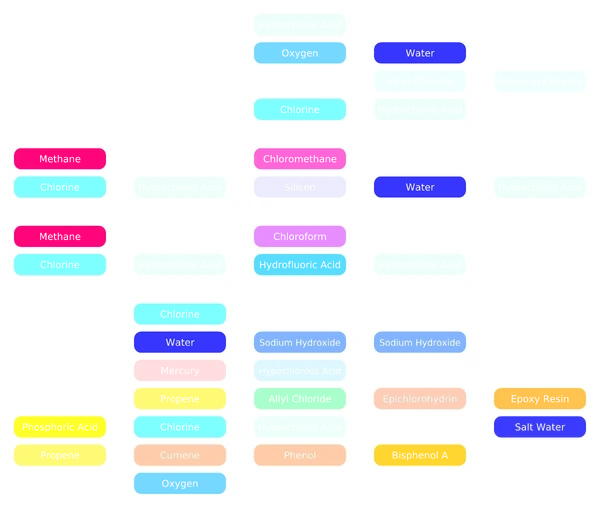| This article is a work-in-progress. It may be finished in the near future, check its history to see previous edits. |
With version 5.09.30 the chemistry of GT5U has become a lot more realistic, but also a lot more complex. This page describes how to obtain the new basic materials and how to process them.
Starting materials[]
Only non-elemental starting materials are being listed here.
Acetic Acid[]
Can be obtained by distilling Fermented Biomass, Vinegar, or Wood Vinegar, or synthesized from Methanol and Carbon Monoxide. Used for producing Glue or Acetone.
Acetone[]
Can be obtained by distilling Wood Vinegar, by treating Cumene with Oxygen, or by smelting a mixture of Acetic Acid and Calcium. Used for producing Epoxy Resin or Glue.
Benzene[]
Can be obtained by distilling Wood Tar or Heavy Fuel. Used for producing Cumene.
Ethylene[]
Can be obtained by distilling Naptha or Wood Gas, or from treating Ethanol with Sulfuric Acid. Used for producing Polyethylene and Polyvinyl Chloride.
Hydrochloric Acid[]
Can be obtained from synthesizing Hydrogen and Chlorine, also gained as a byproduct from producing Polydimethylsiloxane, Polytetrafluoroethylene, or Epichlorohydrin. Used for producing Polyvinyl Chloride and Bisphenol A production.
Hydrofluoric Acid[]
Can be obtained from synthesizing Hydrogen and Fluorine. Used for producing Polytetrafluoroethylene.
Phenol[]
Can be obtained from distilling Wood Tar or Heavy Fuel, or by treating Cumene with Oxygen. Used for producing Epoxy Resin.
Phosphoric Acid[]
Obtained by treating elemental Phosphor with Oxygen and Water, or by treating Apatite dust with Sulfuric Acid and Water. Used for producing Cumene.
Propene[]
Obtained by distilling Naphtha. Used for producing Epoxy Resin.
Sodium Hydroxide[]
Obtained by electrolyzing Salt Water, or by treating elemental Sodium with Water (do not try this at home). Used for producing Epoxy Resin.
Acids[]

Visualization of the new processes for complex acids
Only acids with a complex production process are shown here.
Nitric Acid[]
Produced from Ammonia, Oxygen and Water (the Water is recycleable). Used for producing Indium, Industrial TNT, and Platinum Group Sludge.
Sulfuric Acid[]
Produced from either elemental Sulfur, Oxygen, and Water, or from Hydrogen Sulfide, Water, and Oxygen (the Water is recycleable). Used for producing Batteries, Epoxy Circuit Boards, Industrial TNT, TNT.
Alternatively Hydrogen Sulfide can react with Hydrogen Dioxide to produce elemental Sulfur and Water.
Plastics[]

Visualization of the new processes for plastics
'Normal reaction' and 'Polymerization' are performed in a Chemical Reactor. Polymerization recipes always follow the same pattern: The monomer can be treated with either Compressed Air or with Oxygen to produce the Polymer. Optionally tiny amounts of Titanium Dust can be added. Oxygen and Titanium increase the Polymer output by 50% each.
Epoxy Resin[]
Produced from Acetone, Chlorine, Mercury, Phenol, Propene, Sodium Hydroxide, and Water. Used for producing circuit boards. Becomes available at Low Voltage (requires Oil though).
Polydimethylsiloxane[]
Produced from Chlorine, Methane, Silicon, and Water. Used for Wetware Life Support Circuit Boards, EV+ Pumps, and SMD Capacitors. Becomes available at Medium Voltage.
Polyethylene[]
Produced from Ethylene. Used for producing Machine Hulls (mandatory for HV+), circuit components, Fluid Pipes, and more. Becomes available at LV (requires Oil though).
Polytetrafluoroethylene[]
Produced from Chlorine, Hydrofluoric Acid, and Methane. Used for producing ZPM+ Machine Hulls, Wetware Life Support Circuit Boards, Large Chemical Reactors and Fluid Pipes. Becomes available at High Voltage.
Polyvinyl Chloride[]
Produced from Ethylene, Hydrochloric Acid, and Oxygen, or from Ethylene and Chlorine. Used for producing Item Pipes.
Miscellaneous[]

Visualization of the new miscalleneous processes
Glue[]
Produced from Acetic Acid, Ethylene, Oxygen and either Acetone or Methanol. Used for producing Graphene, Phenolic Circuit Boards, Super Fuel Binder, and various assembler recipes.
Rocket Fuel[]
Produced from Ammonia, Chlorine, Mercury, Methanol, and Oxygen. Used for powering Galacticraft Rockets.
Note: Because Galacticraft does not support separate Fuel/Oxidizer tanks the fuel is obtained by mixing the fuel and the oxidizer before filling the mixture into the rocket. In real life this would turn your rocket into a bomb. Or rather, your mixer, as 1,1-dimethylhydrazine spontaneously ignites on contact with an oxidizer. Used for powering Galacticraft Rockets.
| |||||||||||||||||||||||||||||||||||||||||||||
